Meet the newest members of the Transgender Media Lab Tech Team: PhD Fellow Cara Tierney, MA Fellow Brooke Modestita, and Undergraduate Research Assistant Jada Gannon-Day
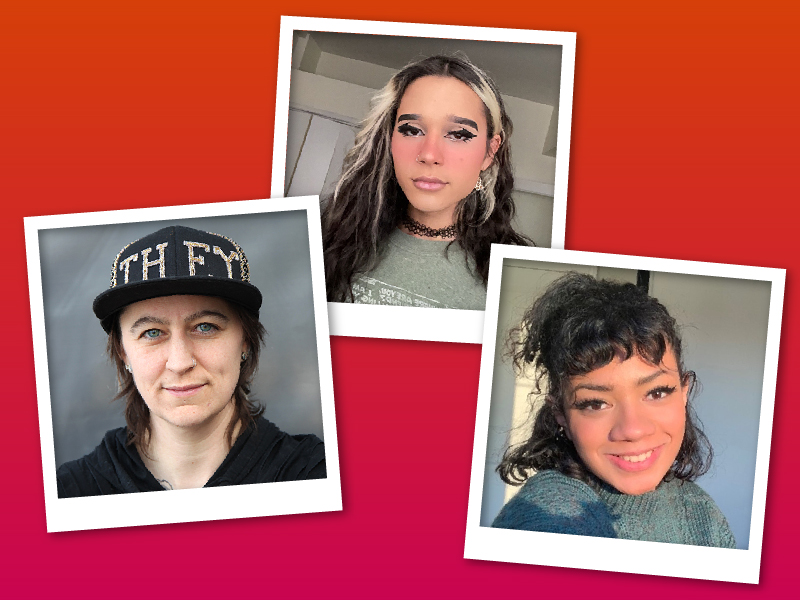
Photos of Cara (left), Brooke (center), and Jada (right).
Some basics: What’s your name, (and optionally) pronoun, and some of your past experiences that led you to today?
CARA: Cara (they/them). I’m an Ottawa-based artist and educator. My artistic background is in performance art, and I have been teaching in some capacity since as long as I can remember. I studied art in my undergrad and, not feeling equipped to “be an artist” upon graduation, I decided to follow my arts degree with an MA in art history at Carleton.
Finding my feet as an artist coincided with my coming into my queerness and transness and, as a result, a lot of the work I produced at the outset of my creative career is a reflection of that process. A few years back I met, and built a rich collaborative project with, an artist/social worker whose focus was working with trans youth and families of trans youth. Together we designed and delivered workshops that centered creative practice and used the pedagogical nature of art as a way to invite workshop participants into critically reflecting on their own experiences of gender. Combined with the way I understood my own creative practice in relation to my queerness/transness, these experiences underscore my current interest in exploring the way art fosters dialogical spaces where we can access nuanced understandings of (gender) identity.
BROOKE: My name is Brooke, short for Brooklyn, and I use she/her pronouns. I got my undergraduate degree at West Virginia University in Women and Gender Studies. I also had three minors in Sociology, Native American Studies, and Africana Studies. I was born in Rhode Island and grew up there, as well as in Boston, MA. Many people ask me why I would go from Boston to West Virginia. Well, the answer to that is when I was in high school, I was on the debate team, and I was very passionate about this and was able to get a debate team scholarship to WVU in order to continue this passion of mine. This allowed me to both get my degree and continue an extracurricular activity that I enjoyed throughout high school. Now, why I am here in Canada, however, is not as easily explainable. My mentor attended Carleton, and she encouraged me to apply to Canadian schools that have well-rounded gender and feminist research programs. I currently attend McMaster and not Carleton, but it is still nice to be working with the Trans Media Lab at Carleton!
JADA: My name is Jada. I use they/she pronouns, and I am an undergraduate anthropology student at Carleton. My experience lies primarily in community organizing and activism. I started organizing and taking part in rallies from around age 14. In high school, I led an initiative to advocate for and increase understanding of gender-inclusive restrooms, spaces, and awareness in Ottawa’s public schools and city facilities. In 2016, I had the opportunity to engage with public educators as a “book” in the 2016 Rainbow Youth Forum’s Human Library. Additionally, this experience gave me lasting connections to some of Ottawa’s queer and trans spaces, which I believe played a major role in bringing me here. Later in high school, I saw a lack of representation of the lives of marginalized students and felt that our experiences were being retold and interpreted through a limited lens of adulthood alone. I attended Elizabeth Wyn Wood, one of Ottawa’s secondary alternate programs, where many of the students had been alienated from conventional schooling through their identities, their experiences, or their needs. I felt that these experiences, perspectives, and voices needed to be represented and connected, so I started a student-led, -edited, and -produced newspaper, The Students’ Voice. This newspaper was designed to highlight the art, media, events, and written works of our student population. That project allowed me to examine the relationship between representation and structural change, something that really drew me to the Trans Media Lab.
Beyond those experiences, though, the influence and education from community members has led me here. I am beyond grateful for the communities and individuals who took the time to see me, to work with me, to critique and correct me, and to invite me into their spaces. Having a sense of grounding in a community has allowed me to take part in projects like these.
CARA: OOOOOOOooooooooh!!! I am so curious about the gender-inclusive restrooms initiative, Jada! I’m working on an art project that deals with this. My project is still in pretty early stages – and is likely to be something I continue indefinitely. The goal is to approach orgs and businesses who still have binary gender washrooms and invite them to donate their bathroom signs to my project in exchange for new ungendered signs and trans-inclusion training. I then take the old signs and mount them like hunting trophies with a certificate of authenticity that explains how they were decommissioned! I have an example up on my website and a few more under construction! http://www.caratierney.com/decommissioned/
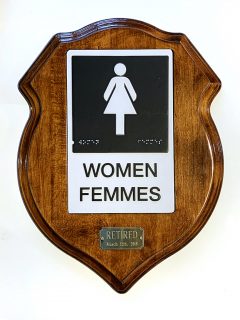
Decommissioned, by Cara in collaboration with fin xuan (2021-ongoing)
JADA: I LOVE this!!! What an amazing idea and approach.
Who are some of your favourite trans media producers or trans media “texts”?
CARA: No matter where I find myself, Del Lagrace Volcano’s Gender Queer Qu’est-ce Que C’est? never fails to deliver. The short video documents a street performance/intervention wherein Volcano searches high and low for a “man” or a “woman.” With a deceptively simple line of questioning – “What makes you a man?” or “What makes you a woman?” – they quickly upset the perceived stability of the gender binary. I’m particularly inspired by the way the respondents are so eager to engage and be given the opportunity to think more deeply about their understanding of, and relationship to, gender identity and expression. I regularly encounter this desire to engage and reflect on such a foundational aspect of identity in my own educational outreach work. Trans folks do this work out of necessity, where cis folks have the privilege of taking their genders for granted. Creating this conversational space for everyone to reflect on gender and gender oppression is a process I am deeply passionate about.
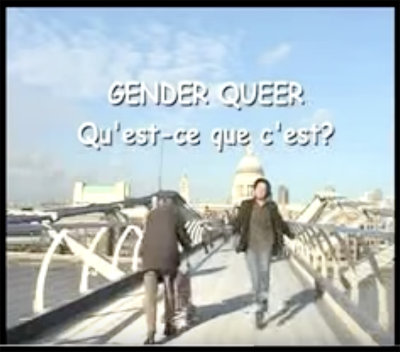
A still from Del La Grace’s “Gender Queer, Qu’est-ce Que C’est?”
BROOKE: One of my favorite readings, as it relates to discussions of transness, is by Calvin Warren, “Calling into Being: Tranifestation, Black Trans, and the Problem of Ontology.” I have also read some follow ups by other scholars like “This Body Which is (Not) Mine: Blackness, Gender, and the Antagonism of Embodiment” by Nicholas Eppert, which covers transness but gender more broadly and how it intersects with blackness. I am also a big fan of Calvin Warren’s more general work on the intersections of blackness and queerness, his two articles called “Onticide” where he explores the relationship of blackness and queerness and the unique violence that permeates that social location.
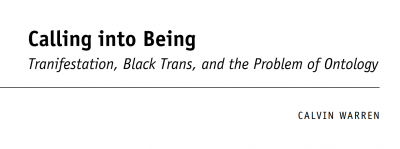
A screenshot of the title page for Calvin Warren’s “Calling into Being” article in Transgender Studies Quarterly.
JADA: One of the things I so deeply love about this age in media is the ability to explore and create media outside of traditional and mainstream formats. The increased accessibility of photo and video sharing platforms has allowed so many marginalized people the ability to produce content that has been pushed out of traditional media, really expanding on the ability to speak for oneself and represent trans experiences and people beyond just bodies or spectacles for the consumption of cisgender audiences. I also have a deep appreciation for the adaptability of online content creators, their ability to use numerous, constantly changing platforms is incredible. For these reasons, I think it is so important that we highlight new and non-traditional media.
Some of my favourite trans creators are producing content on YouTube. A creator who appealed to me from an early age is Kat Blaque, a black transgender commentator and visual artist who examines topics like gender, race, sexuality, mental health, and relationships. I discovered her content when I was in high school, questioning my own identity and struggling at the intersection of race, gender, and sexuality. The ability to discover perspectives that didn’t isolate those aspects of my identity was so new and exciting to me. It was incredibly impactful for me to recognize that there was space in my blackness to be queer, that I did not have to sacrifice any aspect of my multifaceted identity to exist and engage in discourse, that my identity was not and did not need to be singular. I and other QTBIPOC are able to be complex, to have opinions, beliefs, passions, and disagreements.
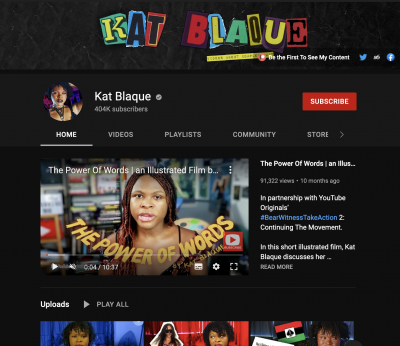
A screenshot of Kat Blaque’s YouTube channel.
What drew you to join the Trans Media Lab?
CARA: I’m particularly drawn to action-oriented projects that support the creation of art and/or community. The Trans Media Lab promises to deliver on both of these counts. Having the opportunity to work with, and learn from, trans folks and allies from a diversity of backgrounds and disciplines in the service of upholding and sharing creative work made by trans artists is pretty dreamy to be honest! As the project framework is committed to centering the lived reality of trans folks, I’m also eager to see the way the Trans Media Lab can actively support trans activist efforts.
BROOKE: I think I stumbled upon the Trans Media Lab in a very unique way. My undergrad professor actually went to Carleton and that is why I ultimately applied to Carleton and a bunch of other Canadian schools from the US. Within that application process, exploring possible avenues to help pay for grad school and my expenses, my professor stumbled upon an application and a job description. When I read it, I immediately fell in love with the potentiality of the project as well as the possibility to merge my interests in this unique way. After receiving the position, then realizing I might not attend Carleton, I was very saddened by the possibility of not only missing out on working with Laura but on working on this project. Luckily, as Laura has an answer for most things, she made it work so I could attend McMaster and still be a part of the Trans Media Lab and Trans Media Portal.
JADA: When I learned about the Trans Media Lab through my program faculty, I immediately felt excited that a project like this exists, as I had spent years looking for something like this. I remember spending hours looking for queer and trans representation, especially in film and television, and struggled to find media that was produced by queer and trans people, especially queer and trans BIPOC. I was exhausted with the limited, and often poor or harmful, representation of people like myself and my friends. At the same time, I saw trans friends and community members creating media and struggling for visibility, having their stories dismissed or ignored entirely. I was drawn to join the Trans Media Lab because these resources have been missing for so long. I am beyond excited to take part in this project and to work with trans artists, creators, academics, activists, and community members.
What is something you are passionate about/particularly invested in?
CARA: While I am, in the most immediate sense, very committed to completing my PhD, this desire for completion is motivated by my passion for supporting local emerging queer and trans creativity. Since the isolation of the pandemic – compounding the already isolated process of academic research and writing – I’m most eager to devote myself more fully to helping build a strong local community/network of queer and trans creatives. While I am eager to continue pursuing my own artistic interests in a more substantial way, I’m particularly keen to build collaborations and support, and create opportunities for emerging creatives.
BROOKE: I am passionate about getting my masters and eventually my PhD. I want to become a professor, and I think that is the only job I could genuinely see myself enjoying and seeing as fulfilling. I think this is due to my fondness for both teaching but also reading and writing scholarship. My dream is to be able to be that scholar who has their pivotal theory, the new thing that gets quoted and used in order to create better analysis and solution-making. I think I’ve found that, but I don’t want to get ahead of myself here. Either way, it is my goal to eventually create that, offer a new language to articulate and dismantle systems of oppression.
JADA: I am very passionate about the relationship between activism in colonized and diasporic communities and academic spaces, challenging the disconnect between structural analysis and lived experience and making space for both to not only coexist, but enhance each other. I want to encourage more BIPOC to become involved in social sciences. I think it is important to challenge the notion of BIPOC experiences as elements of theory alone, as this does a disservice to both the affected communities and our research.
What excites you most about working with the Trans Media Lab this year, and what are some of your goals with this project?
CARA: I’m keen to learn more about the history of trans media production. In particular, I am interested in paying attention to the way festivals that have shown work and been an active presence have, in some way, contributed to a strengthening of local communities. I am also excited to see the way the Trans Media Lab can leverage its social/cultural capital to support trans communities and individuals.
BROOKE: What really excites me is all that I am going to learn. I am very new to trans media as a body of work. I read trans literature, but I have not heavily invested my research into the media side of things, while having seen some films here and there that cover trans life like Paris is Burning. I am excited to delve more into that, especially being on the Trans Media Lab’s research team, I will be actively looking for and finding that material, and that really excites me. I think my main goal is bringing my best self and putting everything I can into this project. My biggest concern is not giving back all that I can for all my trans people of colour who cannot and will not be able to have this opportunity. I want to make sure that what I put into this project is reflective and creates a roadmap and a guide post for trans folks of colour first and foremost, but for all trans people as well.
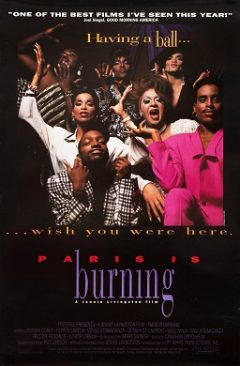
Poster for Paris is Burning (1990).
JADA: I am incredibly excited to meet and engage with trans creators and media in a space that is centred around trans-made media! Trans art is often viewed and understood through the lens of cisgender experience and speculation alone, and I am so excited to look outside of that and put a focus on the many experiences of being trans, especially when it comes to the intersection of race, colonialism, and trans identities.
CARA: This has me wondering how much of my own creative work has inadvertently been made for, or in anticipation of, the inescapable (and internally conditioned) cis lens…
JADA: I can relate to this a lot! I think there can be this challenging position as trans, non-binary, agender, and two-spirit artists where we need to perform in accordance with cisgender lenses/standards but also want to authentically represent our experiences in their complexity. I think this is part of why it’s so important to build communities and spaces for trans media.
Outside of academia, what do you enjoy? What are some things that bring you joy and comfort, particularly during this time of immense change?
CARA: Walking with my dogs. In the last year of social confinement I have gotten to intimately know the area surrounding my house. Rather than sticking to the routes I had gotten to know so well over the last decade of living here, I challenged myself to explore every possible road on the map within a 30km radius. The dogs also got used to this more exploratory walking style and have become quite demanding, refusing to walk our habitual paths and asking to be taken in the car to more distant and diversely scented trails! Inspired by some of the foragers and farmers I follow on social media, I also developed a passion for looking closely at local flora and finding edible treats along our walks.
JADA: I find this really cool and interesting! I have been learning to identify some of Ottawa’s native plants and fungi and have been reading foraging blogs for a while.
CARA: Any blogs you would recommend? At the moment I’m mostly driven by my love of cooking (and eating). Laura’s Facebook posts about mushroom foraging definitely helped move me past the “but what if I poison myself” fear of wild mushrooms!!
JADA: I’ve definitely made use of iNaturalist and a little field guide to (gradually) work on identifying.
BROOKE: Outside of academia, I love drawing, watching anime, binging shows, and gaming. Recently, I have been really invested in League of Legends, playing it in most of my free moments even though I haven’t had too many of those. When I am in the mood to draw, I love to draw people or cool things I see in anime so I would say my style is reflective of the anime I see. I recently did my first print, which was very nerve wracking because I was not sure it was good enough or that I was, but my friend encouraged me and now we both have a framed copy in our bedrooms. Right now I am watching the new season of Dear White People and enjoying all of what Canadian Netflix has to offer.
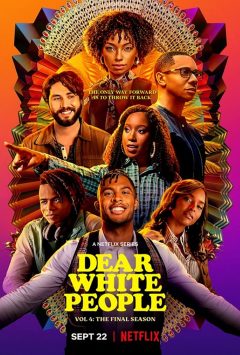
Promotional poster for Dear White People (2017-2021).
JADA: Recently, I’ve really enjoyed spending time outside and feeling connected to the land. I have always loved the colder months and enjoy taking long walks and runs when I can. I have two gardens and a small collection of indoor plants that have helped with getting through the year of isolation. I also love to read and write fiction. I spent a lot of my summer planning out and writing short stories, primarily in the social science fiction genre.